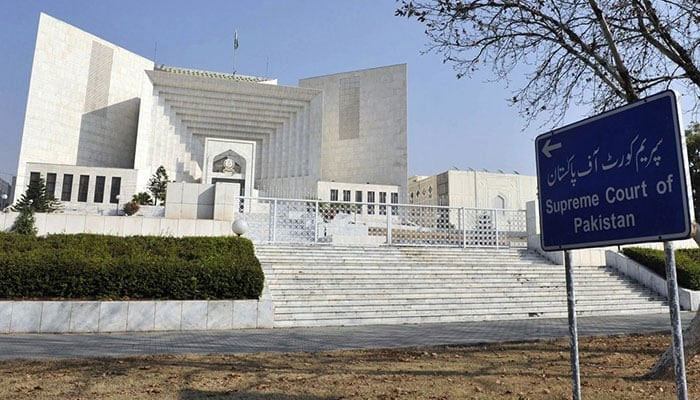SC panel to decide on live telecast of ZA Bhutto reference
In this respect, the committee will furnish its report to the chief justice of Pakistan on December 11
ISLAMABAD: The Supreme Court has constituted a two-member committee to decide on the live telecast of a presidential reference filed some 11 years back concerning the murder case of former prime minister ZA Bhutto.
The committee — comprising Justice Athar Minallah and Justice Muhammad Ali Mazhar — will decide whether the proceedings should be telecast live or not and whether the recording should be issued or not after the conclusion of the reference.
In this respect, the committee will furnish its report to the chief justice of Pakistan on December 11.
It is pertinent to mention that a nine-member larger bench of the Supreme Court — headed by Chief Justice of Pakistan (CJP) Justice Qazi Faez Isa — will take up the reference on December 12.
The other members of the larger bench include Justice Sardar Tariq Masood, Justice Mansoor Ali Shah, Justice Yahya Afridi, Justice Aminud Din Khan, Justice Jamal Khan Mandokhail, Justice Muhammad Ali Mazhar, Justice Syed Hasan Azhar Rizvi and Justice Musarrat Hilali.
Bilawal Bhutto Zardari had filed an application with the Supreme Court pleading to become a party to the presidential reference.
He had submitted that his grandfather Zulfiqar Ali Bhutto was brutally executed in consequence of a stroke of a pen adding that his life could not be brought back by a similar stroke but his dignity and valor could be restored and reflected correctly to some extent in the books of precedent and legal history of the country.
Bilawal further stated that in the United Kingdom the famous case of R verses Mattan was a testament of the fact that miscarriage of justice should be rectified even posthumously. He stated that in that particular case, the family of the wrongly executed person was granted a massive monetary compensation.
However, the PPP chairman submitted that he did not claim any monetary compensation but for him it lay in correcting the history.
Bilawal felt that if the miscarriage of justice was rectified and due care and diligence was exercised while dispensing justice then his purpose would be served and a victory would be achieved not only for himself but also for the people, democracy, and the judicial system.
-
 Inside Cardi B's Real Feelings Related To Stefon Diggs Split Post One Year Of Romance
Inside Cardi B's Real Feelings Related To Stefon Diggs Split Post One Year Of Romance -
 Former Sri Lankan Intelligence Chief Arrested Over 2019 Easter Bombings
Former Sri Lankan Intelligence Chief Arrested Over 2019 Easter Bombings -
 Kristen Bell Shares One Rule For 'SAG' Awards Ceremony That She Will Ditch This Time: 'Happy And Fun'
Kristen Bell Shares One Rule For 'SAG' Awards Ceremony That She Will Ditch This Time: 'Happy And Fun' -
 Woman Suing Meta Platforms, YouTube Over Social Media Addiction Sticks To Claims After Trial
Woman Suing Meta Platforms, YouTube Over Social Media Addiction Sticks To Claims After Trial -
 Shakira Applauded For 'gracious' Behaviour By Fans As She Blends Work With Family Downtime
Shakira Applauded For 'gracious' Behaviour By Fans As She Blends Work With Family Downtime -
 Prince William Hits The Roof With The Andrew Saga Bleeding Into Earthshot
Prince William Hits The Roof With The Andrew Saga Bleeding Into Earthshot -
 Mexico’s President Considers Legal Action Over Elon Musk Cartel Remark
Mexico’s President Considers Legal Action Over Elon Musk Cartel Remark -
 HBO Gives Major Update About 'Industry' Season Five And Show's End
HBO Gives Major Update About 'Industry' Season Five And Show's End -
 Donnie Wahlberg Responds To 'Boston Blue' Backlash: 'Nobody Was More Disappointed Than Me'
Donnie Wahlberg Responds To 'Boston Blue' Backlash: 'Nobody Was More Disappointed Than Me' -
 Jennifer Garner Gets Emotional Over Humble Career Start: 'It Makes Me Want To Cry'
Jennifer Garner Gets Emotional Over Humble Career Start: 'It Makes Me Want To Cry' -
 Princess Beatrice Told An Acquaintance That She ‘likes’ Jeffrey Epstein: Grim Verdict Drops
Princess Beatrice Told An Acquaintance That She ‘likes’ Jeffrey Epstein: Grim Verdict Drops -
 Late Katherine Short's Neighbours Give Insights Into Her 'peace Loving' Personality Post Suicide
Late Katherine Short's Neighbours Give Insights Into Her 'peace Loving' Personality Post Suicide -
 Fresh Details Of King Charles, Queen Camilla's US Visit Emerge Amid Andrew Investigation
Fresh Details Of King Charles, Queen Camilla's US Visit Emerge Amid Andrew Investigation -
 Iran 'set To Buy' Chinese Carrier-killer Missiles As US Forces Gather In Region
Iran 'set To Buy' Chinese Carrier-killer Missiles As US Forces Gather In Region -
 Prince Harry And Meghan Unlikely To Meet Royals In Jordan
Prince Harry And Meghan Unlikely To Meet Royals In Jordan -
 Hero Fiennes Tiffin Shares Life-changing Advice He Received From Henry Cavill
Hero Fiennes Tiffin Shares Life-changing Advice He Received From Henry Cavill




